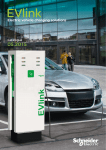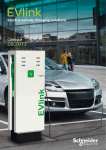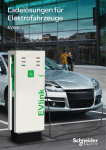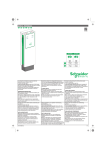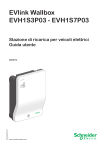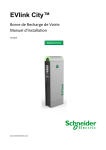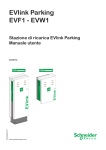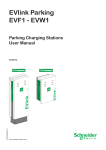Download EVlink - Electric vehicle charging solutions
Transcript
EVlink Electric vehicle charging solutions Catalogue 04.2014 Electric vehicle charging solutions EVlink charging solutions: giving e Health Air About 50% of the CO2 compared with a conventional vehicle* No greenhouse gas emission Smart grid Ecoresponsibility An ecoresponsible solution for everyday travel 2 Boosts the expansion of smart grids * 'From the well to the wheel - European mix' evaluation – Source: EDF 2010 energy to the future The creation of a reliable, efficient network of charging stations will greatly boost the development of electric vehicles Schneider Electric is a partner of the SAVE and ISSYGRID charging network projects and other international projects. Our partners have chosen to equip their dealer's premises with EVlink charging stations A voluntary quality marking. Safety, Interoperatibility, Performance and durability certified by ASEFA, a third party laboratory. Schneider Electric is involved in E.V. Ready project. A founding member of the EV Plug Alliance, Schneider Electric is campaigning for the rapid adoption of charging infrastructure standards in order to ensure user safety. This label guarantees that charging facilities are of the highest safety level, economical and in compliance with the latest IEC standards in force. Electric vehicle charging solutions Electric vehicle charging solutions 4 Electric vehicle charging solutions Contents Discovery p. 7 The electric vehicle Where to charge Charging Charging architectures p. 8 p. 9 p. 10 p. 12 The EVlink product range p. 13 Overview of EVlink charging stations EVlink Residential charging stations and accessories EVlink Wallbox charging stations and accessories EVlink Parking charging stations and accessories EVlink Fast charge Electric vehicle simulation tool EVlink Cable p. 14 p. 16 p. 20 p. 24 p. 30 p. 32 p. 35 Managing the energy of a charging station p. 37 Energy management stakes Charging station fed by the facility network Charging station directly fed by the utility grid Charging stations control p. 38 p. 40 p. 41 p. 42 Supervising operations p. 43 EVlink Supervision p. 44 Solutions for your project p. 51 Solutions for your project 'Turnkey' project Services for designers and installers Services for operators p. 52 p. 53 p. 54 p. 54 List of references p. 55 5 Discovery 6 Electric vehicle charging solutions Discovery Electric vehicle charging solutions 7 Discovery The electric vehicle 4 major items: 3 4 2 1 Focus on technology The batteries Battery technology has made very significant progress in recent years. Lead has gradually been discarded for other more efficient compounds. 1 The motor One or more motors equip the vehicle. Depending on size and performance, the total capacity ranges between 15 and 200 kW. Example: 48 kW (65 hp) for a small 4-seater saloon. 2 The battery set The charger converts the alternating current from the charging station into direct current and limits the inrush current to the maximum acceptable by the cable + charging station combination. 4 The charging inlet It provides the energy necessary for the motor to operate. Charging takes place either during deceleration of the vehicle (motor in generator mode) or upon connection to a charging station. The vehicle is equipped with one or two inlets by the manufacturer depending on the type of charging required: The capacity of the batteries is approximately 5 to 40 kWh, at a voltage of 300 to 500 V. >>at least one inlet for 'normal' or 'accelerated' charging on the AC network Battery and distance range >>possibly a second inlet for charging at a fast charging station The vehicle’s distance range depends on battery capacity but also the driving style, the route configuration and the use of accessories (headlights, heating, etc.). 8 3 The charger Research is continuing with a view to improving capacity and reducing weight and heating during power inrush. The technology most commonly used at present is lithium-ion. These new batteries have no memory effect and can therefore be charged without having to wait for them to be completely discharged. They can be found in telephones, laptop computers and certain aircraft, but also in electric cars. Electric vehicle charging solutions Where to charge At home A charging station dedicated to private usage is installed in the garage. At home - apartment complex A charging station dedicated to indoor or outdoor usage, installed on a private parking place. At work Some companies decided to install charging stations in their own parking areas. They have the choice: either free or paid charging for users. Municipal fleets, and the fleets of delivery services and government departments generally have parking areas fully equipped for charging their electric vehicles. On a secure parking area SH I OP Aware of new customer expectations, operators of covered public parking area frequently propose charging stations on their parking areas. They can generally be accessed with a badge, based on various commercial conditions. Municipalities and car park managers are now developing these services. At service station Service stations equipped for fast charging are appearing at test locations in some countries. The 30 minutes of charging required are used to have a break or do some shopping in the supermarket. Electric vehicle charging solutions 9 Discovery Charging The charging mode determines the safety level Low Mode 1 Acceptable High Mode 2 Mode 3 Mode 4 Direct connection of the vehicle to the grid Direct connection of the vehicle to the grid Direct connection of the vehicle to the grid >> Non-dedicated power socket (domestic socket) >> Simple cable >> Risk of overheating, prohibited in the United States. >> Non-dedicated power socket >> Dedicated power socket incorporating charge monitoring >> Cable with communicating charge monitoring device. Indirect connection of the vehicle to the grid, via an external charger >> Direct-current external charger incorporating charge monitoring >> Dedicated cable. >> Dedicated cable. The type of charging connector determines the maximum permissible charging capacity (1) Manufacturers' data (2) Type 1 Type 2 Max. power (single-phase) 3 kW 7 kW Max. power (three-phase) 22 kW Max. current 32 A Type 2 Type 3 (1) Subject to a suitable cable cross section. (2) The IEC 62196-62 standard defines higher values in anticipation of technological development. The effective charging capacity is that of the weakest 'link', for example: Vehicle charger Cable / charging mode Charging point Effective charging capacity 7 kW 3 kW (mode 2) 2 kW 2 kW 7 kW 7 kW (mode 3) 22.1 kW 7 kW Domestic power socket 10 Electric vehicle charging solutions The power of the source determines the speed of charging* Example for a vehicle fitted with a 22 kWh battery and having a touring range of 150 km: Source used Domestic power socket Dedicated AC power socket Dedicated DC power socket Power Single-phase: 2 kW Single-phase: 7 kW Three-phase: 43 kW Three-phase: 22 kW Time to 'fill up' 12 h 5h 1h30 min 30 min Focus % of charge reached in 30 min on technology 4% 10% 34% 100% * Subject to the use of a suitable cable. The charging cable Neutral Phase Earth Pilot wire Using a charging station Check the availability of the charging station Defective socket: (intrusion prevention, safety, etc.) Socket not available: reserved or undergoing maintenance, etc. Plug in to the charging station Check that the vehicle is fully charged Disconnect from the charging station 1 1 Charging can be stopped manually at any time 2 A 'pilot' wire allows data communication between the vehicle and the charging station. The latter will start charging only if the following information is present: - vehicle connection OK - vehicle earthing OK - indication of the maximum power allowed by the charger 2 Socket available: free 3 Electric vehicle charging solutions 11 Discovery Charging architectures Protective devices The charging station operates autonomously. It has a dedicated protective device. Installation: by an electrician Borne isolée Location: residential, private usage Each charging station operates independently. They are protected upstream and their consumption can be measured. n Electrical protectio Installation: by an electrician Location: parking area, shared usage Sup erm arke Meters t PLC Modem Com. network n Electrical protectio Meters The charging stations are clustered thanks to a controller which manages all features at cluster level, including energy management, driver access control and authentication as well as commissioning. Project: Schneider Electric project to customer specifications Location: parking charging station, shared usage, fleet charging station twork Communication Ne SH 12 OP I Electric vehicle charging solutions The EVlink product range Electric vehicle charging stations Electric vehicle charging solutions 13 The EVlink product range Overview of EVlink charging stations EVlink Residential Standard residential EVlink Wallbox Tough environment, for secure sites page 16 Charging stations with or without attached cable >>Power range: 3.7 to 11 kW page 24 Water resistant and shockproof charging stations with or without attached cable >>Power range: 3.7 to 7.4 kW >>Indoor installation >>Outdoor - indoor installation >>Wall-mounted >>Wall-mounted >>For single-phase network To connect the car to the charging station EVlink Cable Several vehicle connector / plug combinations are available for charging stations. 14 Tough environment page 20 >>For single-phase and three-phase networks page 35 EVlink Parking Free-access charging stations >>1 or 2 socket-outlet >>Power range: 7.4 or 22.1 kW >>For single-phase or three-phase network >>Outdoor - indoor installation >>Floor-standing or wall-mounted Protection and monitoring panels for EVlink Parking charging stations Standard architectures, turnkey or to be built to Schneider Electric specifications. Based on protection, metering, automation and communication components. Electric vehicle charging solutions Suggested applications EVlink EVlink EVlink Residential Wallbox Parking EVlink EVlink Energy Supervision Parking RFID Fast Charge Management Private garage indoor Private place outdoor Block of flats – underground parking area Block of flats – outdoor parking area Public covered parking area On street parking place – no secure Private corporate parking area Hotel parking area Shopping center parking area Fleet parking area Car sharing parking place Gas charging station Schneider Electric supports you throughout the project and during exploitation: EVlink Parking (RFID) Tough environment, user authentication Design, implementation and maintenance service offers. Audits and expert analysis. EVlink Fast charge Custom designed for projects only page 24 page 30 >>1 or 2 socket-outlet Charging stations with or without RFID badge monitoring (wireless, contactless) >>Power range: 7.4 to 22.1 kW >>1 or 2 attached cables >>For single-phase or three-phase network >>Direct current power: 60 kW >>Outdoor - indoor installation >>Alternating current power: 43 kW >>Floor-standing or wall-mounting >>For three-phase network Access charging stations with RFID badge >>Outdoor - indoor installation >>Floor-standing mounting Savings on costs Energy and cluster management software page 38 >>Management of charging stations clusters >>Energy management >>Data transfer to Supervision Electric vehicle charging solutions Enterprise-wide management Supervision >>Usage analysis >>Maintenance >>Drivers management page 44 15 The EVlink product range EVlink Residential In short Extensive choice Range of 6 charging stations: >>Wall-mounted >>3.7 to 11 kW charging >>Without attached cable: T3 socket-outlet >>With attached cable: T1 or T2 connector Robustness Mechanical strength: IK08 Indoor installation: IP41 Easy to use 'Plug & charge' Energy management The charging power can be automatically reduced by means of a loadshedding device, in order to avoid a black out during the activation of high power priority loads (oven, dish washer...). Charging operations can be locked in peak hours be mean of an off-peak hours contactor, in order to reduce the cost. When started during off-peak hours, the charging can be maintained or not in peak hours. Installation By an installer: a trained electrician The installer performs an audit of the home's electrical installation, which must be able to withstand without risk the power inrush during charging. The electrical switchboard is arranged to receive the appropriate protective devices in accordance with electrical regulations. Complete verification of correct operation using the EV simulation tool. 16 Electric vehicle charging solutions Application EVlink Residential charging stations are designed to allow private users to have a charging point dedicated to their electric vehicle: in their garage, integrated into the house or not. Discovery Luminous segments: charging time elapsed STOP button STOP indicator AUTO indicator AUTO START button S TA R T STOP Detection of fault Connection with EV is OK Socket-outlet access flap Socket-outlet base Connection with EV is OK The luminous segments are also used at start-up and to indicate data interchange with the vehicle. 3 possible ways to start charging: utomatic: immediate, after connection 1 A eferred: at defined times, upon information 2 D from an 'off-peak hours' contact or a time switch 3 Forced: by pressing the 'START' button, without waiting for deferred engagement 3 possible ways to stop charging: utomatic: when charging is completed 1 A arly: at the end of off-peak hours or at the end 2 E of the time slot programmed in the time switch 3 Forced: by pressing the 'STOP' button without waiting for automatic or early stoppage The 'Deferred' and 'Early' controls are available after adding an 'off-peak hours' contactor or a time switch. Electric vehicle charging solutions 17 The EVlink product range EVlink Residential Characteristics Characteristics of the power supply network >>Frequency: 50 Hz or 60 Hz >>Earthing system: TT or TN >>Voltage required for the power circuit: - 230 Va 1P+N for 3.7 and 7.4 kW charging stations - 400 Va 3P+N for 11 kW charging stations >>Voltage required for the monitoring circuit: 230 Va 1P+N (Supply can be diverted from the main power cable) Charging characteristics >>Mode 3 with T3 socket-outlet or attached cable with T1 or T2 connector >>Communication between charging station and vehicle via charging cable as per IEC 61851 Safety: > Vehicle earthed during charging > Charging current limiting according to the capacity of the weakest element of the charging system (vehicle, charging cable, charging station) > Charging station switching to fault mode upon a charging cable or network problem Mechanical and environmental characteristics >>Material: polycarbonate >>Degree of protection (as per IEC 60529): IP41 >>Degree of mechanical protection (as per IEC 62262): IK08 Charging station type ZE Ready from Renault Total weight Dimensions (H x L x D) Charging station without attached cable 2.5 kg 323 x 242 x 100 mm Charging station with attached cable 5 kg Environment Working temperature -25°C / +50°C Storage temperature -50°C / +80°C Relative humidity rate (RH) < 93% Certification EVlink Residential has obtained the CB test certificate issued by the LCIE test laboratory, establishing compliance with the IEC 61851-1 and IEC 61851-22 standards. EVlink Residential allows the implementation of a 'ZE Ready' installation subject to setup in accordance with Renault's instructions and performed by an accredited professional. Easy to install Surface mounting, arrival of the power supply duct at the bottom of the housing. 2.3 N.m Click! x4 1.2 N.m 18 Electric vehicle charging solutions Commercial references Residential charging stations Marketing Socket-outlet Power or connector (kW) type Supplied with circuit breaker (1) Ref. T3 3.7 yes NCA11130 7.4 yes NCA11230 3.7 no NCA19130 11 no NCA19330 T1 3.7 no NCA11100 T2 11 no NCA19310 With socket-outlet Available in France only International T3 With attached cable (2) International ex France (1) 30 mA residual current circuit breaker, rating according to charging station power. (2) Cable holder included. To connect the car to the charging station Electric vehicle simulation tool Cable holder Several vehicle connector / plug combinations are available for charging stations. It allows complete verification of satisfactory operation of the charging station and charging cable, in the field. It allows the cable to be wound up for easy storage. It is installed on the wall. EVlink Cable Please refer to page 35 Electric vehicle charging solutions Reference: NCA93100 Reference: NCA00100 19 The EVlink product range EVlink Wallbox In short Extensive choice Range of 6 charging stations: >>Charging power: 3.7 or 7.4 kW under 230 Va >>Without attached cable: T3 socket-outlet >>With attached cable: T1 or T2 connector Robustness Mechanical strength: IK10 Indoor or outdoor installation: IP54 Easy to use Incorporated cable holder 'Plug & charge' Energy management The charging power can be limited (from 3.7 to 2.3 kW and from 7.4 to 3.7 kW) by closing a contact wired to the charging station. This can be achieved by mean of a time switch, during peak hours or a load shedder to deal with power constraint in the building. Installation By an installer: a trained electrician The installer performs an audit of the home's electrical installation, which must be able to withstand without risk the power inrush during charging. Ensuring that the charging station has a dedicated power supply from the switchboard with the appropriate MCB and RCD in accordance with standards. Complete verification of correct operation using the EV simulation tool. 20 Electric vehicle charging solutions Application The charging stations are weatherproof and robust therefore can be used in tough environments: At home, at work, in a public covered car park, hotels... Discovery Single connector attached cable Type 1 Type 3 Socket-outlet Stop/Start pushbutton with lighting indications Charging station with attached cable Type 2 Charging station with socket-outlet Lighting indications Stand-by mode In this mode, either the charging cycle will start automatically as soon as the vehicle is connected and ready for charging, or the battery is fully charged. Charging in progress In this mode, the charging cycle can be interrupted by depressing the Stop / Start pushbutton. Charging interrupted Manually with the pushbutton. In this mode, the charging cycle can re-activated by depressing the Stop / Start pushbutton. Fault detection The pushbutton must be depressed for five seconds to select the diagnostic mode. Diagnostic Alternated colors indicate the type of fault detected. Electric vehicle charging solutions 21 The EVlink product range EVlink Wallbox Characteristics Characteristics of the power supply network >>230 Va 1P+N >>50 or 60 Hz >>Earthing system: TT or TN Charging power control circuit Contact to be closed between the charging station and the power supply phase. Charging characteristics >>Mode 3 with T3 socket-outlet or attached cable with T1 or T2 connector Mechanical and environmental characteristics >>Material: polycarbonate >>Degree of protection (as per IEC 60529): IP54 >>Degree of mechanical protection (as per IEC 62262): IK10 Total weight Dimensions (H x L x D) Charging station without attached cable Charging station type 4.8 kg 480 x 330 x 170 mm Charging station with attached cable 6.4 kg 480 x 330 x 170 mm Attached cable length: 4 m Environment Working temperature -30°C / +50°C Storage temperature -40°C / +85°C Certification ZE Ready from Renault EVlink Wallbox has obtained the CB test certificate issued by the LCIE test laboratory, establishing compliance with the IEC 61851-1 and IEC 61851-22 standards. Easy to install Surface mounting, the power supply can be at the bottom or top of the housing. EVlink Residential allows the implementation of a 'ZE Ready' installation subject to setup in accordance with Renault's instructions and performed by an accredited professional. 22 The cover is removed before cabling Electric vehicle charging solutions Commercial references EVlink Wallbox Marketing Socket-outlet or connector type Power (kW) Ref. T3 3.7 EVH1S3P03 7.4 EVH1S7P03 3.7 EVH1S3P0A 7.4 EVH1S7P0A 3.7 EVH1S3P0C 7.4 EVH1S7P0C With socket-outlet With attached cable T1 T2 To connect the car to the charging station Electric vehicle simulation tool Several vehicle connector / plug combinations are available for charging stations. It allows complete verification of satisfactory operation of the charging station and charging cable, in the field. EVlink Cable Please refer to page 35 Electric vehicle charging solutions Reference: NCA93100 23 The EVlink product range EVlink Parking In short Extensive choice Range of 32 charging stations: >>Floor-standing or wall-mounted >>7.4 to 22.1kW >>T2 or T3 socket-outlet >>1 or 2 socket-outlet per charging station >>With or without RFID badge reader, for user identification Robustness Mechanical strength, IK10 Indoor and outdoor use High IP level: IP54 Supplement Independent charging stations: simplified automation Grouped charging stations: common energy management functionalities, supervision on web pages Installation By a single person: a trained electrician The charging station is delivered in three packages for easier handling and installation. The electrical switchboard is adapted or created to ensure the optimal level of protection and monitoring on the charging stations. Complete verification of correct operation using the electric vehicle simulation tool. 24 Electric vehicle charging solutions Application The EVlink Parking charging station product range is designed to meet the requirements of secure parking areas (closed, with filtered access, or under surveillance): Parking areas of: - companies - fleets - car lease, etc The charging stations can be installed outdoors or indoors. Discovery Socket-outlet status Shutter release button Fault indication light Maintenance/reservation indicator light Socket-outlet available indicator light Charging Stop button Charge indicator light Sensor for RFID badge reading (depending on version) Socket-outlet with protective shutter Independent charging stations Clustered charging stations One or more charging stations can be connected to the same protection panel but operate completely independently via their own on-board control functions: >>Automatic charging safety controls >>RFID access control to charging (depending on version) >>etc Advanced control functions: >>EVlink Energy management >>EVlink Supervision are accessible when the charging stations are clustered. The protection panel may be that of a building. Electric vehicle charging solutions They are then under the control of a programmable logic controller and network components: switch, GPRS modem, etc. These components are brought together in a protection, monitoring and control panel dedicated to the set of charging stations. A set consists of floor-standing and/or wall-mounted charging stations, up to 30 socket-outlets. 25 The EVlink product range EVlink Parking Characteristics Characteristics of the power supply network >>Frequency: 50 Hz or 60 Hz >>Earthing system: TT or TN >>Power circuit voltage (provide for 1 charging point): - 230 Va 1P+N for 7.4 kW charging stations - 400 Va 3P+N for 22.1 kW charging stations The appearance may be customized on request. Please don't hesitate to contact your Schneider Electric representative to assist you in this project. >>Control circuit voltage (provide for a specific circuit): 230 Va 1P+N Safety: Each circuit must have upstream protection against overloads, short circuits and insulation faults. Charging characteristics >>Mode 3 with T3 or T2 socket-outlet >>Communication between charging station and vehicle via charging cable as per IEC 61851 Safety: > Vehicle earthed during charging > Charging current limiting according to the capacity of the weakest element of the charging system (vehicle, charging cable, charging station) >C harging station switching to fault mode upon a charging station or charging cable or network problem RFID reader (depending on model) >>Access to the socket-outlet by unlocking the flap after wiping the badge in the reader >>Frequency of reading and writing: 13.56 MHz >>Compatible with badges to ISO 15693 and ISO 14443 A and B standards >>10 badges supplied with each charging station equipped with a reader Mechanical and environmental characteristics >>Material: painted steel, with corrosion protection treatment on covers >>Degree of protection (as per IEC 60529): IP54 >>Degree of mechanical protection (as per IEC 62262): IK10 Total weight Dimensions (H x L x D) Floor-standing charging station Charging station type 43.5 kg 1 425 x 330 x 200 mm Wall-mounted charging station 25.7 kg 460 x 330 x 165 mm Environment EVlink Parking allows a 'ZE Ready' installation subject to setup in accordance with Renault's instructions and performed by an accredited professional. Working temperature -25°C / +50°C Storage temperature -40°C / +80°C Relative humidity rate (RH) < 95% Maximum altitude 2 000 m Certification EVlink Parking has obtained the CB test certificate issued by the LCIE test laboratory, establishing compliance with the IEC 61851-1 and IEC 61851-22 standards. 26 Electric vehicle charging solutions Commercial references Floor-standind charging stations Charging station type No. of Socketsocket-outlet outlet type Power 7.4 kW 22.1 kW T2 EVF1S7P02 EVF1S22P02 T3 EVF1S7P03 EVF1S22P03 T2 EVF1S7P22 EVF1S22P22 T3 EVF1S7P33 EVF1S22P33 T2 EVF1S7P02R EVF1S22P02R T3 EVF1S7P03R EVF1S22P03R T2 EVF1S7P22R EVF1S22P22R T3 EVF1S7P33R EVF1S22P33R Plug & Charge - without RFID reader 1 2 With RFID reader 1 2 EVF1S7P0• EVF1S7P2•R One socket-outlet charging station. Two socket-outlet charging station (possibility to charge 2 vehicles simultaneously), with RFID reader. Wall-mounted charging stations Charging station type No. of Socketsocket-outlet outlet type Power 7.4 kW 22.1 kW T2 EVW1S7P02 EVW1S22P02 T3 EVW1S7P03 EVW1S22P03 T2 EVW1S7P22 EVW1S22P22 T3 EVW1S7P33 EVW1S22P33 T2 EVW1S7P02R EVW1S22P02R Plug & Charge - without RFID reader 1 2 With RFID reader 1 EVW1S7P0• EVW1S7P2•R One socket-outlet charging station. Two socket-outlet charging station (possibility to charge 2 vehicles simultaneously), with RFID reader. Electric vehicle charging solutions 2 T3 EVW1S7P03R EVW1S22P03R T2 EVW1S7P22R EVW1S22P22R T3 EVW1S7P33R EVW1S22P33R 27 The EVlink product range EVlink Parking Commercial references Pack of 10 RFID badges Protective cover For charging stations equipped with a RFID reader. The badges are supplied blank, ready to be programmed to identify an administrator or user. For wall-mounted charging stations. Sheet of labels to be stuck on the badges: 1 administrator + 9 users. It locks user access to incoming cables. Degree of protection: IK10 Reference: EVP1WPSC Reference: EVP1BNS Cable holder EVlink Cable For floor-standing and wall-mounted EVlink Parking charging stations. Several vehicle connector / plug combinations are available for charging stations. It allows the cable to be wound up for easy storage. Reference: EVP1PH Electric vehicle simulation tool Please refer to page 35 Specific components for monitoring and control panel Software on SD card for Modicon M340 PLC. EVlink Energy & Cluster Management Software Reference: NCA82000 EVlink Cluster Management Software Reference: NCA84000 Wireless–internet communication interface, supplied with its accessories. It allows complete verification of satisfactory operation of the charging station and charging cable, in the field. EVlink Supervision GPRS modem Reference: NCA91000 Reference: NCA93100 28 Electric vehicle charging solutions Practical information Dimensions (mm) Wall-mounted charging station Floor-standing charging station 460 1425 330 165 200 330 Composition Floor-standing charging station 1 Wall-mounted charging station 2 3 2 1 1 4 1- Cap 2- Core of charging station 3- Wall base 4- Floor base Easy to install Floor-standing charging station Electric vehicle charging solutions Wall-mounted charging station 29 The EVlink product range EVlink Fast Charge In short The choice Range of fast charge stations >>Standard or with additional equipment >>500 V direct current and/or 400 V alternating current Cover structure Mechanical strength, IK10 Indoor and outdoor use High IP level: IP54, charged and uncharged Installation The charging stations are designed for facilities such as service stations and parking areas for business vehicle fleets. A feasibility study must be carried out to assess the facility's ability to provide the necessary power, identify electrical duct routing, etc. A protection and monitoring panel is arranged in an existing panel or created to ensure the optimal level of protection and monitoring for the charging station. Application EVlink Fast Charge stations are designed to charge a vehicle rapidly: 80% of capacity charged in 30 minutes, for a 20 kWh battery. They are intended for service stations in particular. 30 Electric vehicle charging solutions Characteristics Mechanical and environmental characteristics >>Degree of protection (as per IEC 60529): IP54 >>Charging station dimensions (H x L x D): 2080 x 1070 x 662 mm >>Working temperature: -30°C / +50°C >>Weight: approx. 700 kg Characteristics of the range Direct current charging station >>Charging in mode 4 >>CHadeMO type connector >>Charging voltage/current: 500 V DC / 120 A >>Power supply: 400 Va (+10/-15%) – 80 A – 3 Ph – 50-60 Hz >>Electrical protective devices integrated into the charging station Direct current + alternating current charging station >>Charging in mode 4 and mode 3 >>Direct current charging: - CHadeMO type connector - charging voltage/current: 500 Va / 120 A >>Alternating current charging: - Type 2 connector - charging voltage/current: 400 Va / 63 A >>Electrical protective devices integrated into the charging station Cable length: 3 m Additional functionalities available >>Strengthened screen >>Subscriber badge reading User dialogue and data >>5.7' backlit touch-sensitive LCD screen for display of the residual charge and to enter the charge set point value (duration, number of kWh, euros) >>Charge management - charge according to the amount in your local currency, charging time or kWh requested - connector locking during charging >>Data supplied on Ethernet port >>Data transmission Operating data, status, activation/deactivation of the charging station, etc Commercial references Charging stations 500 V DC 500 V DC + 400 Va Fast charging stations Standard Please contact us Charging stations with special equipment Strengthened screen Please contact us RFID badge reader Strengthened screen + RFID badge reader Electric vehicle charging solutions 31 The EVlink product range Electric vehicle simulation tool In short Tool of the trained electrician To check correct operation of a charging station >>EVlink Residential >>EVlink Parking >>Any charging station complying with IEC 61851-1, by simulation of a vehicle during charging 'All-terrain' use Robustness >>IK strength: IK8 >>Resists falls of up to 1 m >>IP54: closed >>IP44: open Easy to carry >>Weight: 6 kg Compatibility Accepts any cable fitted with a T1 or T2 connector Single-phase or three-phase alternating current charging In complete simplicity... Simulation tool connected, charging started by pressing a button, the result is visible on an indicator lamp. A few minutes to check correct operation of a charging station. … and full independence Power supply via the charging cable No internal battery, the length of servicing operations is not limited. 32 Electric vehicle charging solutions Application The simulation tool is used to check the right charging process without an electric vehicle and with a current < 1 A. The tests are valid on EVlink charging stations and all those operating in mode 3 or simplified mode 3 complying with the IEC 61851-1 standard. >>Test on the electrical installation and wiring upstream of the charging station (detection of absence of neutral or phase-neutral inversion) >>Test on tripping of the residual current circuit breaker for each charging station phase >>Check on the strength of the customer's charging cable connector >>Check on the charging-cable pilot wire and check on the charging station by simulation of the various standardized statuses of an electric vehicle >>Test on the charging station contactor upon the triggering of charging by communication signals Discovery BNC connectors: - measurement of the resistance in a charging cable connector - observation of charging currents and PWM communication signals on oscilloscope PP INLET TYPE 1 CP PP INLET TYPE 2 INLET SELECTOR TYPE 1 TYPE 2 Selection of test base PHASE 1 PHASE 2 PHASE 3 NEUTRAL-PHASE INVERSION Base for Type 2 connector TEST LAMP Base for Type 1 connector TEST DIFF PHASE SELECTOR L1 L2 L3 EV STATUS B C D Diagnostic indicators: - Voltage presence Phase 1, 2, 3, Phase/ Neutral Inversion - Diagnostic indicator test button EARTH FAULT ON OFF Control of residual current circuit breaker tripping test Selection of test phase Control of 'earth breaking on electric vehicle' simulation Simulation of electric vehicle signals Safety during the tests >>The signals generated by the simulator comply with the IEC 61851 standard >>Load current in the simulator limited to the minimum value allowing complete validity of the tests >>Charging station switching to secure mode in the event of problems on the upstream network or the charging cable Electric vehicle charging solutions 33 The EVlink product range Electric vehicle simulator Characteristics Characteristics of the power supply network Electric vehicle simulator It allows complete verification of satisfactory operation of the charging station and charging cable, in the field. Reference: NCA93100 EVlink Cable >>The simulator is powered via the charging current >>Network frequency: 50 Hz or 60 Hz >>Earthing system: TT or TN (do not use in IT) >>Voltages: - 230 Va on type 1 connector - 400 Va on type 2 connector >>Charging current during test < 1 A Mechanical and environmental characteristics >>Degree of protection (as per IEC 60529): - closed: IP54 - open: IP44 >>Degree of mechanical protection (as per IEC 62262): IK8 >>Dimensions (H x L x D): 270 x 305 x 170 mm >>Weight: 6 kg >>Left-hand base: Type 1 inlet • IEC 62196 type 1 • U: 230V1 • I: < 1 A • F: 50-60 Hz >>Right-hand base: Type 2 inlet • IEC 62196 type 2-II • U: 400V3~ • I: < 1 A • F: 50-60 Hz >>Storage temperature: -30°C / +50°C >>Working temperature: -30°C / +50°C >>Risk of damage to the simulator in the event of dropping at a temperature < -2°C >>Relative humidity rate (RH): < 95% Accessories and documentation included Several vehicle connector / plug combinations are available for charging stations. Please refer to page 35 >>Plasticized User's Manual attached under the cover >>Detailed user manual (to be downloaded from the web) >>BNC/banana plug adapter cord Certification >>The electric vehicle simulator complies with the IEC 61010-1 and IEC 61851-1 standards Recommended measuring instruments for additional tests >>Ohmmeter: to measure the resistance in the customer's cable connector. >>Oscilloscope: for observation of signals during the electric vehicle status simulation test (signals in accordance with the IEC 61851 standard) 34 Electric vehicle charging solutions EVlink Cable Characteristics The charging cable is a key component Great attention was paid to design, quality of components and assembling in order prevent from overheating during charging operations. Quality of the plug and connector and of the cable itself, as well as the quality of the assembly. Main characteristics >>Charging station plug type: T3 >>Vehicle connector types: T1 or T2 >>Charging mode: Mode 3 >>Variant: 1 or 3 phases >>Maximum current: 32 A >>Length: 5 m >>Type of cable: straight >>Operating temperature: -30°C +50°C >>Degree of protection (as per IEC 60529): IP44 >>Degree of mechanical protection (as per IEC 62262): IK10 Type 1 (T1) Certification >>EVlink Cable has obtained the CB test certificate issued by the LCIE test laboratory >>CE compliant Type 2 (T2) 1 phase 3 phases Max. Weight current T3 Type 3 (T3) Ref. T2 32 A 2.5 kg EVP1CNS32132 T2 32 A 3.2 kg EVP1CNS32332 T1 32 A 2.4 kg EVP1CNS32131 Cable holder Compatibility To be mounted on top of the charging station. 1 cable can be rolled on each side. Ref. For EVlink Parking charging station EVP1PH For EVlink Residential charging station NCA00100 Reference: NCA00100 Reference: EVP1PH Electric vehicle charging solutions 35 The EVlink product range 36 Electric vehicle charging solutions Managing the energy of a charging station EVlink Energy Management Electric vehicle charging solutions 37 Managing the energy of a charging station Energy management stakes Energy management. Why ? Reduce investments and operating costs Energy management involves constantly optimizing the quality of service rendered by electrical equipment according to the criteria of: Quality of service Cost ––continuity of service, taking into account the maximum capacity of the installations; ––operating cost, taking into account the price structure of the energy supplier. And for a charging station, in particular? Allowing simultaneous charging of the largest number of vehicles, as quickly as possible... ... while maintaining charging priority privileges, if necessary. How to implement energy management? Power limit Measurements Controller Actuators The 'power subscription' with the energy supplier, or the maximum capacity of the power supply (depending on the cross section of cables, the rating of circuit breakers, etc.). The total power demand, each charging point demand. The controller performs data acquisition and run the algorithms to control total demand and power allocation to the vehicles. The charging stations that can execute an order and temporarily limit the current supplied to the vehicle. Energy contract 38 kW xx kW Circuit capacity Electric vehicle charging solutions In other words, energy management: Avoids disrupting the facility, causing operating losses When a large number of devices in the facility and the charging station are operating simultaneously, the total current is limited and does not risk causing a facility black-out. Reduce energy and electrical infrastructure costs The contract is subscribed to for a capacity less than that of the total loads. The power demand is limited and does not risk leading to overrun penalties or extra costs to bolster the facility's power supply and distribution network. Increases driver satisfaction Each charging station always supplies the maximum available energy. Valid on all the station's charging points, VIP badges provide charging priority advantages for sales reps or customers. Makes operations more efficient Each socket-outlet is defined with a maximum power, to allow for its use and location. The list of authorized badges is centralized to save time for updates. Electric vehicle charging solutions 39 Managing the energy of a charging station Charging station fed by the facility network This is the case for charging stations whose administrative and technical management are grouped together with that of a facility. An example is a company with a fleet of vehicles. Overall energy management (facility + station) is recommended, in particular when the maximum power of the charging station (simultaneous use of all socket-outlets at full power) is significant by comparison with that of the facility. Building automation and EVlink Energy Management, complementary systems In buildings, automatic control systems supervise total consumption and adapt the operation of certain devices to optimize consumption and consumption costs without adversely affecting work efficiency and occupants comfort. The total consumption and that of the charging station are constantly transmitted to the charging station's controller. When this value approaches the limit set by the energy contract, the EVlink Energy Management program sends the charging stations an order temporarily limiting charging. Accordingly, the power demand from the charging stations is that actually available, not exceeding the utility contract or the power distribution capacity. EVlink Energy Management Building Management System Set point 1 Monitoring Power allocation 3 2 3 xx kW 2 1 3 kW 2 Energy contract kW 1 Selecting maximum power. 2 Metering the facility and charging stations consumptions. 3 Real time algorithms to allocate power to Electric Vehicles. Power monitoring Power xx kW Limiting Charging station power 'Dynamic power allocation': EVlink Energy Management maximum power set point is calculated real time. Time 40 Electric vehicle charging solutions Charging station directly fed by the utility grid The charging station's energy is supplied directly by the electricity distribution system. The installation includes a power meter and a circuit breaker set to the subscribed demand. This case generally applies to parking charging stations for which management is independent from a facility. Energy management is systematically recommended to optimize capital costs and energy supply subscription costs. EVlink Energy Management, for compliance with the energy contract In the protection and control panel, EVlink Energy Management program loaded in the controller ensures energy management. The maximum power set point parameter is configured at commissioning, together with the charging points power allocation scenario (see description on next page). The controller constantly monitors the charging station's total power. Based on this information, and if necessary, it can at any time activate or cancel charging station power limiting. EVlink Energy Management Set point 1 Monitoring Power allocation 3 2 3 xx kW 3 1 Energy contract 2 kW 1 Selecting maximum power. 2 Metering the facility and charging stations consumptions. 3 Real time algorithms to allocate power to Electric Vehicles. Power monitoring With 'Static power allocation' the maximum power set point value is equal to the subscribed demand or any fixed value. This mode can also be adopted when the charging station is fed by a facility network. In that case the set point depends on the electrical sizing of the charging station's power supply circuit, or operational need. Electric vehicle charging solutions Maximum set point Power Charging station power xx kW Time 41 Managing the energy of a charging station Charging stations control xx kW EVlink Energy Management power allocation scenarios The controller performing energy management can at any time reduce the charging station's power by sending orders to all the charging points. A choice of scenarios is proposed at commissioning, making it possible to take into account varied needs related to the use of the vehicles coming for charging. Each charging station has the ability to limit its output As soon as a vehicle is connected, charging can begin, but the output can be automatically limited by the charging station: >>either to comply with constraints of maximum power of the vehicle charger, the charging cable or the charging station; Proportional scenario The output of each charging station is reduced by an identical percentage. - xx % Case of charging stations for vehicles and drivers having equal privileges. >>or upon an order received from EVlink Energy Management controller and algorithms. '3 kW priority' scenario The output of the charging stations with highest power requirement is reduced first. - xx % Case of a charging stations where the strategy is to provide the same quantity of energy to all vehicles in the event of a reduction in the available power. VIP badge privileges The station charging a vehicle identified by a priority badge does not apply the requested reduction or only partially. Case of charging stations with RFID badges authentication. Charging of certain vehicles is not penalized for service reasons or to give priority to customers. 42 - xx % VIP Electric vehicle charging solutions Supervising operations EVlink Supervision EVlink Data Access Electric vehicle charging solutions 43 Supervising operations EVlink Supervision Supervision of charging stations EVlink Supervision is a secure operations system… It is designed to allow efficient operation of a network of charging stations: >>centralized remote supervision and management >>real-time management >>directly interpretable display of analysis and statistics >>more efficient maintenance operations. … for communicating infrastructure The supervision servers allow operation of an infrastructure consisting of a single charging station cluster or a number of geographically scattered charging stations. Each charging station exchanges its data via a wireless modem (GPRS). The freedom and security of Cloud Computing The operating status, real time meter values and Charge Detail Records can be accessed locally and remotely with a mere web browser. Schneider Electric has adopted Cloud Computing to collect, store and provide data on the connected charging stations. Using Cloud Computing, the necessary IT resources (servers, application programs, etc.) are made available in real time via Internet. >>Access is possible from any location via a standard web browser. >>The charging station owner is relieved of capital costs and IT administration costs. >>The data is secure, and is backed up automatically. >>The data for all the charging stations is centralized, and access can be defined by facility, by region or for all installations. Data 44 Electric vehicle charging solutions EVlink Supervision: advantages for all stakeholders The management tools are appropriate, and also adapted to multi-facility infrastructure >>Complete visibility of the charging stations. Remote controls, activity reports, consumption analysis. >>Maintenance alarms and trouble shooting information. There is high reactivity in management of authentication badges and consumption reports. Trust in the network of charging stations is enduring: >>since problems are detected automatically, the availability of the charging stations is always high; >>updating of badge-related access rights is very fast, and valid simultaneously at all locations. The cost of maintenance is reduced, The charging stations usage information provided enhance: >>customer satisfaction due to an improved understanding of their behaviour >>the quality of action plans and the relevance of reporting; >>the value of analyses to consider infrastructure changes and capital expenditure. A real 'business' and 'value added' view is possible, thanks to reports allowing cost calculation and data export to your own information systems and customer portals. Electric vehicle charging solutions 45 Supervising operations EVlink Supervision Supervising charging stations without constraints of distance Each charging station collects information from connected charging stations and power meters. It is connected to the communication networks via a GPRS modem. Charging Stations A Wireless transmission (GPRS) Any PC provided with a web browser can obtain access to supervision provided that its user has the necessary access rights. The data exchanges is secured. Charging Stations B Communication Bus Charging Stations C Charging Stations D The data and parameters of all the charging stations are stored and archived in dual secure data centres. This information is made available in the form of web pages, files or data streams. 46 Electric vehicle charging solutions EVlink Supervision features Supervision Be informed of the situation of the charging stations, to react On a geographic map Check off charging stations and their status: active / faulty For each charging station, read the number of charging stations Operational - Charging / Total Be alerted, charging station by charging station, to perform trouble shooting On monitoring screen View alarms, per form drill down Know the status of communication with the charging station On log-book Consult time-stamped events Control a charging station remotely Start/stop charging a vehicle Reboot the modem Parameters Consult operations parameters Electrical parameters, charging parameters Consult and edit charging cluster information Cluster location, site correspondents, etc. Statistics Monitor charging stations activity Overall, by region or profit centre, site by site On tables or charts, consult per day, week, month, year: No. of charges per charging station Total max. charging station power Cumulative total charging station consumption Export statistics to Excel files For specific analysis and reporting User management Authorize access via RFID badge Activate and deactivate badges Record transactions for each badge Consult the time-stamped charging log (badge identifier (UID), kWh) Export operation reports Download the file of operations for external processing using standard software (Excel, Access, etc.): sorting by period, by user, creation of spreadsheets, etc. Electric vehicle charging solutions 47 Supervising operations EVlink Supervision The dashboard for your network of charging stations For supervision: a clear, customizable dashboard It covers only the information that is useful each day, grouped by theme in widgets. A choice of several widgets is displayed simultaneously on the dashboard, while the others can be accessed by scrolling: >>charging station location and status, >>occupancy indicators… The user selects only the widget corresponding to his needs and the parameters of each widget allow it to be customized by choosing its periodicity, for example. A choice of widgets for relevant monitoring, in real time 48 Locating charging stations and their status Detailed status of the charging stations Charging station occupancy For each charging station an indicator displays the number of charging stations operational/ inoperational. Percentage of charging stations in operation, in load shedding, in maintenance, fault mode. Number of charges for the selected period. Charging stations availability Occupancy rate Duration of charges Percentage of charging stations available and unavailable, breakdown by duration of unavailability. Charging stations occupancy indicators. Average duration of charges diagram. Cumulative energy Energy consumed during charges Distributed to vehicles since last reset. Statistics per day, per week, per month or per year. Electric vehicle charging solutions Navigation via tabs On the dashboard, tabs give access to the areas of operation. Dashboard Map Supervision Monitoring Parameters Setup Settings Charge Log Statistics Alarms Subscriber Management User Management A specific access according to the user Identification of the EVlink Supervision user is required to protect data and prevent operations that could adversely affect operation of the installations. The two access levels are differentiated by password: >>'Site administrator' access: allows access to all pages and functions, including user management. >>'Operator' access: restricted access to 'Supervision', 'Statistics' and 'Parameters Setup' pages and features. Electric vehicle charging solutions 49 Supervising operations EVlink Supervision EVlink Supervision subscription Data collection, access to supervision By taking out an EVlink Supervision subscription it is possible to benefit from supervision services in 'hosted' mode. The subscription covers: >>availability of the servers and the EVlink Supervision application >>data collection and storage >>access to the website via a standard web browser, for operation and users management Security, confidentiality >>GPRS communication Access to the site is protected by password, and each operator has a personalized access and authorizations for consulting and modifying data. It does not include the GPRS modem, the SIM card, or internet access. Access to the site is multi-station, multi-user (Administrator, Maintenance Department, Sales Department, etc.). EVlink Supervision Annual subscription Data communication in accordance with the HTTPS protocol ensures data integrity and confidentiality. Subscription The subscription is taken out for a period of one to three years, renewable by tacit agreement. EVlink Data Access 'System to System' data delivery: Interfacing of EVlink Supervision with management information systems Parking operators, fleet manager, etc., may want to incorporate operating data from the charging stations in their own information systems. EVlink Data Access is a web service capable of meeting this need. Subscription to data downloading EVlink Data Access Provision of personalized data 50 The required data and their format are defined in cooperation with the customer IT application correspondents. Electric vehicle charging solutions Solutions for your project 'Turnkey' project Services for designers and installers Services for operators Electric vehicle charging solutions 51 Solutions for your project Solutions for your project Listen Understand Propose Preliminary technical audit Your Schneider Electric correspondent is a professional, specialized in the charging infrastructure market. It is sometimes necessary to contractualize the solution proposal. Based on the technical and economic data of your charging station project, he will propose to you the most appropriate solution: >>'Turnkey' charging station project performed by Schneider Electric >>Sale of charging stations and services to qualified professionals with possible support at start-up This service is essential when the power of the charging station could jeopardize the electrical infrastructure of an existing facility. >>Services, etc. 52 Electric vehicle charging solutions 'Turnkey' project The charging station project is proposed to you in a contractual document The following are specified: >>precise characteristics of the structure >>schedule of the various project phases and a delivery date >>technical documents submitted for operation and maintenance >>conditions of support services On the agreed date Schneider Electric will deliver a charging station in operating condition and allowing in-situ training of operating personnel. The project is entrusted entirely to the Electric Vehicle Centre of Expertise. A single correspondent for the project team, whatever the subject, commercial or technical. Energy management and supervision are key to the expertise of project teams Solutions >>EVlink Energy Management >>EVlink Supervision Energy are generally included in 'turnkey' projects. Electric vehicle charging solutions 53 Solutions for your project Services for designers and installers Regulatory aspects, architectures for engineering offices and systems integrators: Presentation of charging station design rules (safety aspects). Training in standard architectures established by Schneider Electric and components, allowance for profitability and scalability aspects. Setup, tests, maintenance for installers: Presentation of charging station components. Training in assembly, operating tests and maintenance procedures. Submission of servicing technical documents. Services for operators Technical monitoring: Constant supervision and diagnosis Expert appraisal – advice: Making the most of your charging station Equipped with a permanent link to the data server centre, the charging station is under the control of Schneider Electric specialist technicians. Based on the activity and consumption reports our experts establish an efficiency diagnostic of the installation based on energy cost and equipment availability criteria. If any anomaly is detected, an initial diagnosis is performed. The operator is informed, and can be guided for simple restarting operations. If necessary, operating advice and proposals for technical improvement are submitted. If necessary, the involvement of a partner firm may also be decided on. Maintenance: Preserving availability Schneider Electric has trained and is training a network of local installer-partners. They contribute to routine maintenance of your charging stations and perform work if necessary. They have the support of our Customer Care Centres. 54 Electric vehicle charging solutions List of references Electric vehicle charging solutions 55 List of references EVlink Residential charging station Characteristics (1) References Charging stations with socket-outlet 3.7 kW – T3 – INT NCA19130 11 kW – T3 – INT NCA19330 3.7 kW – T3– FR (supplied with electrical protection devices) NCA11130 7.4 kW – T3– FR (supplied with electrical protection devices) NCA11230 Charging stations with attached cable and cable holder 3.7 kW – T1 – INT; cable NCA11100 11 kW – T2 – INT; cable NCA19310 Accessory Cable holder, 'Residential' design NCA00100 (1) Charging station characteristics = Power – Socket-outlet or connector type – INT: international market – FR: French market only. EVlink Wallbox charging station Characteristics (2) References Charging stations with socket-outlet 3.7 kW - T3 EVH1S3P03 7.4 kW - T3 EVH1S7P03 Charging stations with attached cable 3.7 kW – T1 EVH1S3P0A 7.4 kW – T1 EVH1S7P0A 3.7 kW – T2 EVH1S3P0C 7.4 kW – T2 EVH1S7P0C (2) Charging station characteristics = Power – Socket-outlet or connector type. 56 Electric vehicle charging solutions EVlink Parking charging stations Characteristics (3) References Floor-standing charging stations 7.4 kW – 1 x T2 EVF1S7P02 7.4 kW – 1 x T2 – RFID EVF1S7P02R 7.4 kW – 1 x T3 EVF1S7P03 7.4 kW – 1 x T3 – RFID EVF1S7P03R 7.4 kW – 2 x T2 EVF1S7P22 7.4 kW – 2 x T2 – RFID EVF1S7P22R 7.4 kW – 2 x T3 EVF1S7P33 7.4 kW – 2 x T3 – RFID EVF1S7P33R 22.1 kW – 1 x T2 EVF1S22P02 22.1 kW – 1 x T2 – RFID EVF1S22P02R 22.1 kW – 1 x T3 EVF1S22P03 22.1 kW – 1 x T3 – RFID EVF1S22P03R 22.1 kW – 2 x T2 EVF1S22P22 22.1 kW – 2 x T2 – RFID EVF1S22P22R 22.1 kW – 2 x T3 EVF1S22P33 22.1 kW – 2 x T3 – RFID EVF1S22P33R Wall-mounted charging stations 7.4 kW – 1 x T2 EVW1S7P02 7.4 kW – 1 x T2 – RFID EVW1S7P02R 7.4 kW – 1 x T3 EVW1S7P03 7.4 kW – 1 x T3 – RFID EVW1S7P03R 7.4 kW – 2 x T2 EVW1S7P22 7.4 kW – 2 x T2 – RFID EVW1S7P22R 7.4 kW – 2 x T3 EVW1S7P33 7.4 kW – 2 x T3 – RFID EVW1S7P33R 22.1 kW – 1 x T2 EVW1S22P02 22.1 kW – 1 x T2 – RFID EVW1S22P02R 22.1 kW – 1 x T3 EVW1S22P03 22.1 kW – 1 x T3 – RFID EVW1S22P03R 22.1 kW – 2 x T2 EVW1S22P22 22.1 kW – 2 x T2 – RFID EVW1S22P22R 22.1 kW – 2 x T3 EVW1S22P33 22.1 kW – 2 x T3 – RFID EVW1S22P33R Accessories Parking cable holder EVP1PH Protective cover – only for wall-mounted Parking charging station EVP1WPSC (3) Charging stations characteristics = Power – Number x type of socket-outlet – RFID: badge reader. Additional offer EVlink Management Services components Reference EVlink GPRS Modem NCA91000 PLC software References Energy and Cluster management SD card NCA82000 Cluster management SD card NCA84000 Subscriptions to supervision Reference Annual subscription fee NCA80080 EVlink Cable (4) References 32 A - T3 T2 - 5 m 1 phase EVP1CNS32132 3 phases EVP1CNS32332 32 A - T3 T1 - 5 m 1 phase EVP1CNS32131 Test tool Electric vehicle simulation tool Reference NCA93100 (4) Charging cable characteristics = Max current – Connector types – Length – AC charge number of phases. Electric vehicle charging solutions 57 All 'Electric vehicle' news on the website www.schneider-electric.com/electric-vehicle > Information > Advice > Charging solutions… Make the most of your energy™ www.schneider-electric.com Schneider Electric Industries SAS 35, rue Joseph Monier CS 30323 F- 92506 Rueil Malmaison Cedex France As standards, specifications and designs change from time to time, please ask for confirmation of the information given in this publication. RCS Nanterre 954 503 439 Capital social 896 313 776 www.schneider-electric.com Publication: Schneider Electric Industries SAS Photo: Schneider Electric Industries SAS Printed: COM-POWER-VE-CA3-EN This document has been printed on ecological paper. 04-2014 © 2014 - Schneider Electric - All rights reserved. and much more!




























































